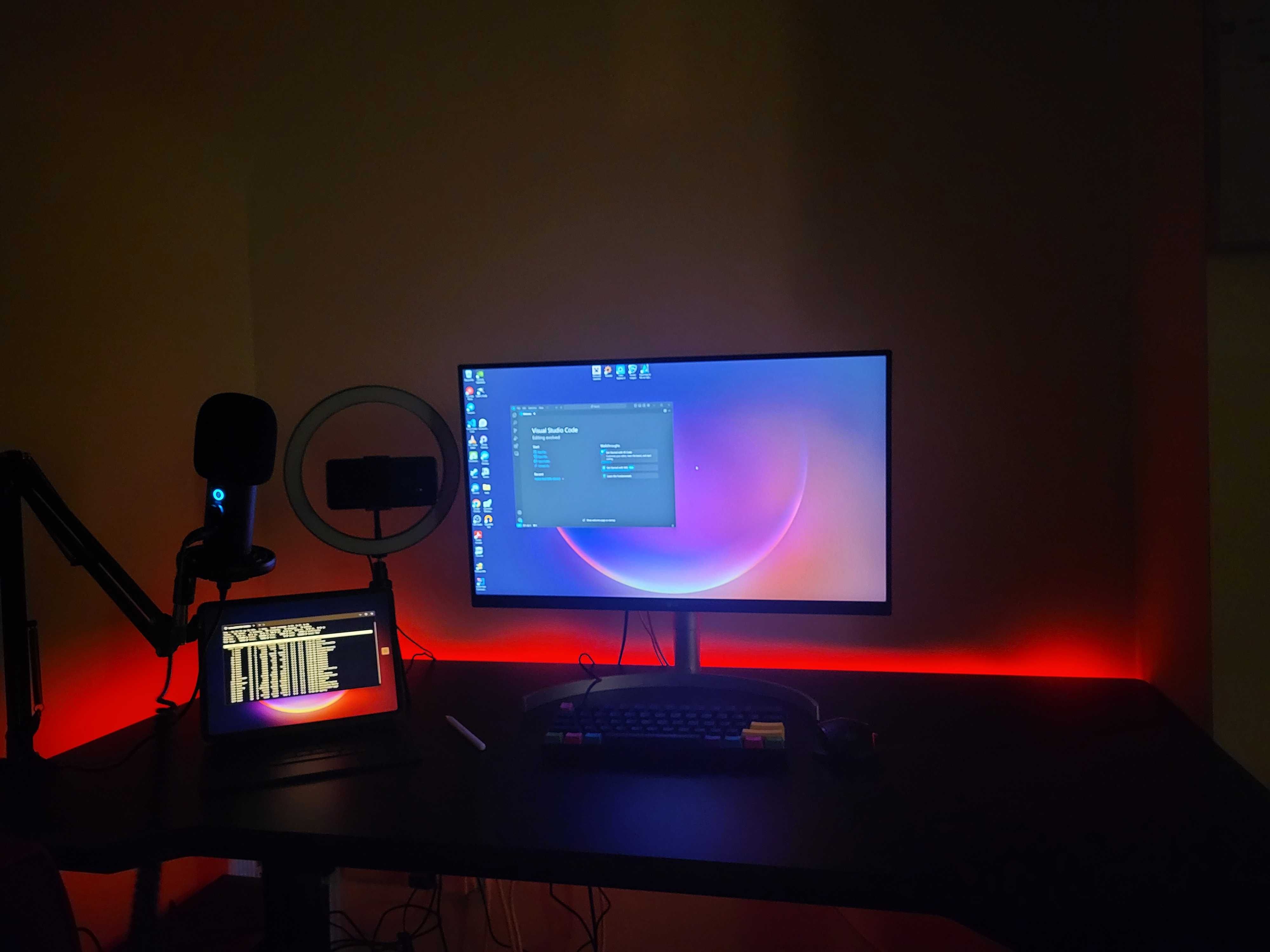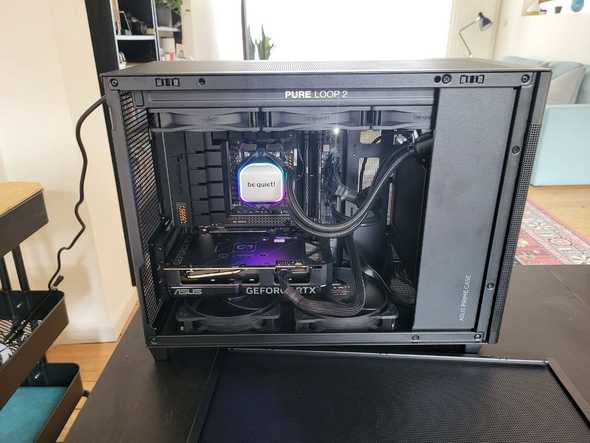Moving to Windows in 2024
March 17, 2024

After 3 years of honored service, I think the time has come to let my Dell XPS 15 retire and build a new machine for all my needs.
I was 15 the time I built my last Desktop PC, and surely things have changed a lot during all these years. Laptops have served me well, but I never managed to get into activities that, unfortunately, are still not ideal on a portable machine.
Connecting several devices with a USB hub is still very unstable, and the power limitations of a battery-powered device are evident whenever I needed to do something more complex than usual. So, thanks to a new remote-working area, I took the opportunity to learn and search for components for my perfect build.
6 months and a lighter wallet later, here I am with a very nice machine that I would like to use for the years to come.
The hardware
- Asus TUF GAMING B650M-PLUS WIFI
- AMD Ryzen 7 7800X3D 4.2 GHz 8-Core Processor
- Asus GeForce RTX 4070 SUPER DUAL-RTX
- Kingston DDR5 Fury Beast 2x16GB 6000
- Asus Prime AP201 Black
- Samsung 980 1TB M.2 SSD
- Samsung 990 PRO 1TB M.2 SSD
Of course, the major investment has been the video card. The overall system is supposed to be quite powerful since the beginning but also expandable in the future. I've opted for an AIO liquid cooling solution, and I must say, overall, the system is incredibly silent when used under normal load. More often than not, it's even quieter than my XPS 15.
The build went smoothly. Updating the BIOS was quite straightforward, even though I was quite surprised to learn that the DDR5 platform is quite unstable, and it just got better after new BIOS updates. For instance, the initial boot time of this machine was longer than 30 seconds just to enter into the BIOS. Why so? It turns out that there are memory checks to perform before booting, and these will take longer the more RAM is installed. It was both fun and frustrating! It really brought me memories of PCs in the 90s that were doing memory checks before booting. Lucky for me, even with optimization turned on, there is a flag to speed up these tests, and so far, my system is running without any instability. The BIOS setting to look for is named "Memory Fast Boot". On Reddit, there's plenty of people discussing this.

The OS
Here's the part I really wanted to write about. It's been more than 10 years since I've ditched Windows 8 in favor of Linux. I still remember the day I installed Ubuntu on my personal laptop, followed some months later by Manjaro, and then by many years of Fedora. I love Linux and I've loved using Linux for all these years. Everything that looked slow and unoptimized under Windows magically turned fast the day I moved to Linux. Startup times, snappiness of software, and ease of development. Compared to Windows 8, that was really another planet. In that period, I also discovered how for me, coding felt like gaming, so I really didn't care about the lack of video card drivers support for my machines. Year after year, though, I got frustrated over some use cases and I realized how not everything about Linux made sense. I know drivers on Windows can sometimes be a source of troubles, but compared to having ALL the drivers installed on the kernel, it works way better. I still don't understand why some people still consider this a positive point. Every time I needed to interact with a new device or I had some special use case (virtual monitors, webcams, microphones, and more) the Linux experience was simply not enjoyable.
I was quite scared to use Windows as my daily OS, but I must admit that I felt the same way I first moved to Linux 10 years ago. And I like it. Of course, it's not a perfect experience, but I am very pleased by the fact that I can simply enjoy an OS objectively and be capable of migrating my workflow without major trauma anytime I want. And while I now have a great desktop PC, I still need to use laptops on a lot of occasions, so I will continue to enjoy the power of Linux on my portable devices.
Without any particular order, I'll try to share some points and thoughts on my experience so far, divided into Good, Ok, Bad. Some of these points are not about Windows, but it should be easy enough to understand which ones. Please don't take them personally.
The GOOD
- Chocolatey works amazingly well. This was the first thing I was scared about using Windows. I love Linux's package managers, and Chocolatey surprised me with the variety of supported software and how easy it is to use.
- The PC is incredibly fast. I had a powerful laptop, but mobile components constrained by 150W of power consumption are really a bottleneck whenever I asked it for demanding activities.
- Windows solved many of the issues it had 10 years ago and can offer a good developer experience with minimal tweaking. Maybe I need to thank Nadella for this, but I still remember how difficult it was to use ADB on Android devices compared to now.
- WSL is a game-changer. I can keep most of my Linux workflows without even noticing I'm on Windows sometimes. Docker feels the same and is very nicely integrated, VS Code terminal runs on Linux, and I've got nothing to regret. Using git, package managers, and more is truly amazing.
- The hardware support is great. I am using Droidcam to use my old phone as a webcam. On Linux, configuring it was a pain and required me to load custom kernel modules (and it was a pain to change the config). On Windows, it took me 30 seconds to achieve the same configuration that took me 3 hours to figure out on Linux. I also discovered that my microphone doesn't have volume issues; it was just Linux that had trouble with it. Furthermore, having a virtual external display is very easy. Doing the same thing on Linux is feasible, but you must have an in-depth knowledge I was not able to get in 10 years of usage. And I tried, I swear!
- The software is overall polished. Postman, Discord, Slack, Teams—the list can be very long. Progressive web apps allowed me to use most of them on Linux as well, but having good desktop support is nice.
The OK
- Dual booting is easier than before, but still not perfect. Installing Windows proved easier than I expected, but having two OSs on the same PC (work and leisure) still requires some tweaking. Whenever I want to boot into the secondary OS, the PC needs to be rebooted. I miss GRUB.
- Window management is okay, but Gnome Shell is way nicer to use. It's not even a feeling. I can make calculations in the search bar, navigate more easily between apps, and it's easier to move apps between workspaces. Maybe I will improve over time, but still!
- A lot of operations feel like magic. Installing the operating system, updating it, and other stuff just works fine, but I would like to have more control over what my PC is doing.
The BAD
- Bloatware, bloatware, bloatware. It takes a lot of time to opt out from Microsoft tracking, spyware, and all the apps that automatically install. Every single software tries to sell you something and cares about sending you notifications you don't really need. I disabled any online search feature and I don't miss it, but it took time.
- Why on earth does Edge think I need games, more games, and even more games whenever I'm logged in with my work account? It knows I'm on my work account because it's a Microsoft account, but still, it thinks that our productivity could be improved by showing games whenever it can. I still need to understand how to disable it.
- So many operations on my machine require a reboot.
The Extras
- I don't have a laptop anymore, so I needed to learn how I can fully use my Anne Pro 2 keyboard without resorting to my laptop keyboard every time I didn't know how to press a key. Now that I've learned it, I am way faster at typing and using additional keys on it. I like it!
Final thoughts
I will probably update the list above as soon as I find new features or get frustrated by others. Overall, I must admit that the OS change was less traumatic than I was expecting, and this is a positive thing, regardless of my opinion about a closed system like Windows. Still, I believe that a company should not have total control over our computers. I will happily use Windows for the foreseeable future, but I will continue to check on how the Linux ecosystem is doing and will try any time I can to find out if the things I'm liking about Windows are improved or not on Linux. I believe that, some years from now, I will move my daily OS back to Linux, and I can't wait to feel again the same way I feel every time I make the switch. Hopefully, my personal space will still be alive, and I will write another post about it.
PS: This is my second time writing this post. The first time I did it, I deleted a file that appeared in my post's folder that, somehow, deleted this post as well. Not sure if it was because of WSL or some error I've made. This is a nice reminder that we should never be too nice about Windows, never :)
